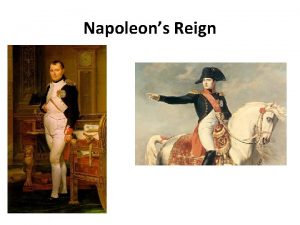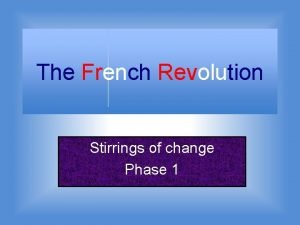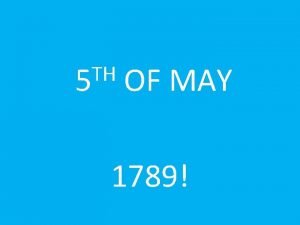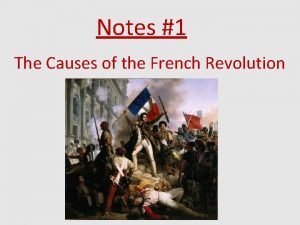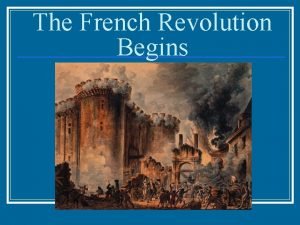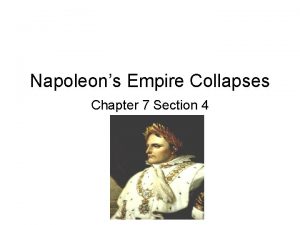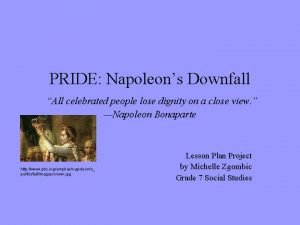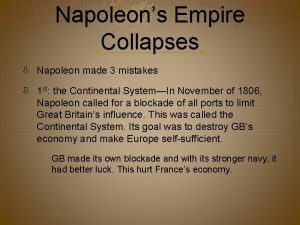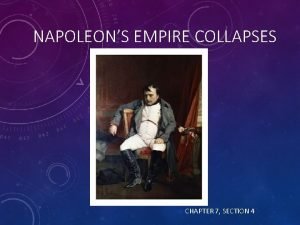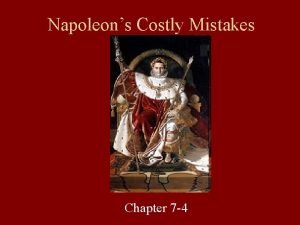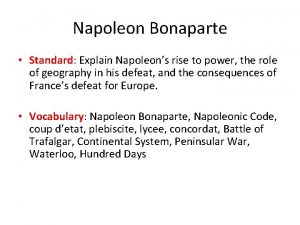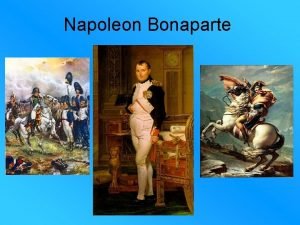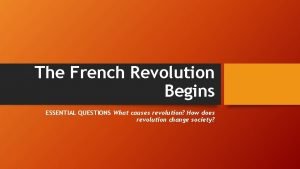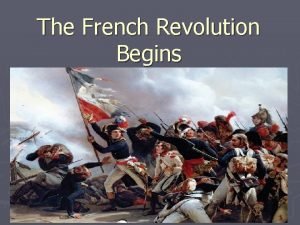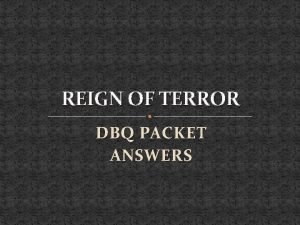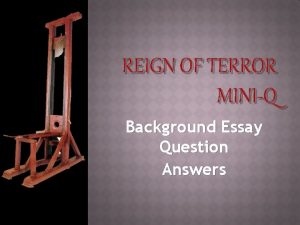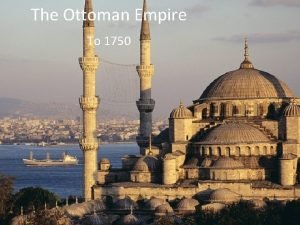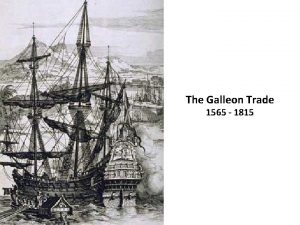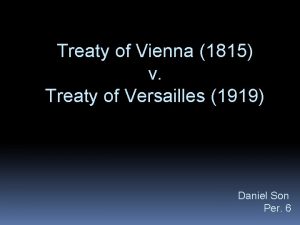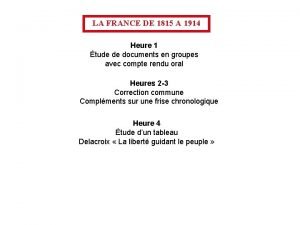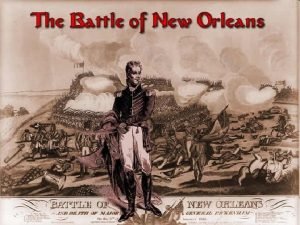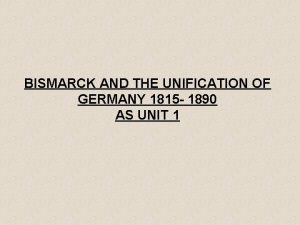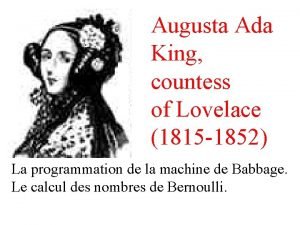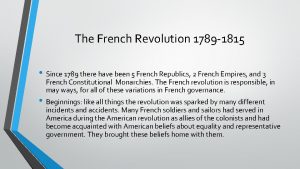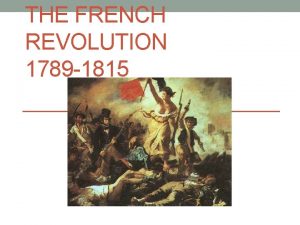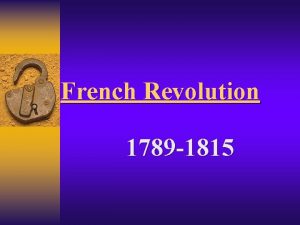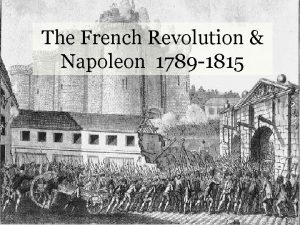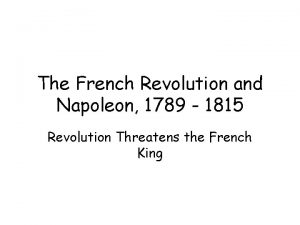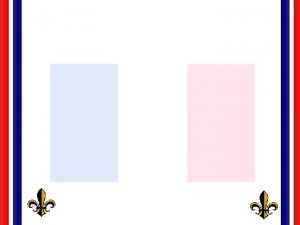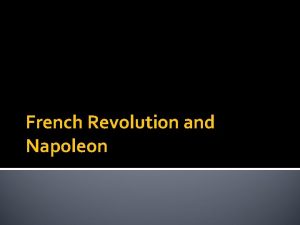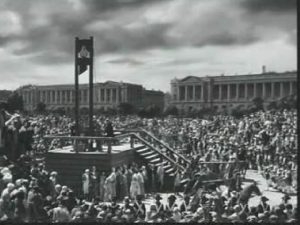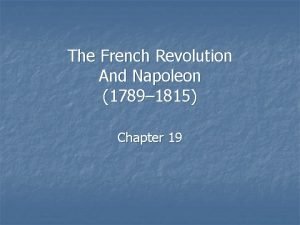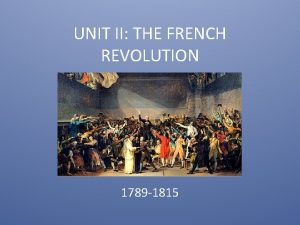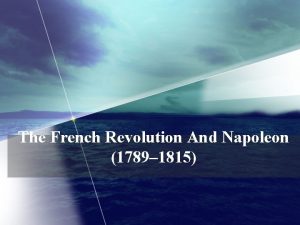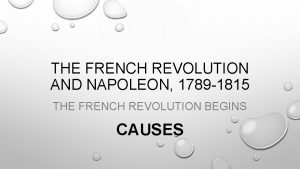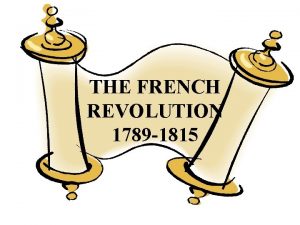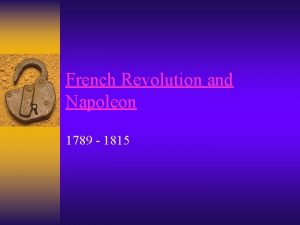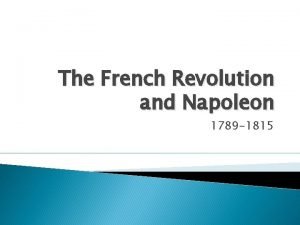FRENCH REVOLUTION NAPOLEONS REIGN 1789 1815 QUESTIONS What































- Slides: 31

FRENCH REVOLUTION & NAPOLEON'S REIGN 1789 -1815

QUESTIONS • What were the causes for the French revolt? • Why was it so difficult for a stable government to function in France? • What were the benefits and the drawbacks to a dictatorship in France?

BACKGROUND • In 1789, France still used an ancien regime • Divided social classes (called estates) • First Estate • Clergy • Second Estate • Nobility • Third Estate • Everybody else (mostly poor)

THE ESTATES

SOCIETY DIVIDED • The clergy were members of the church and had the most wealth and did not pay taxes • Many criticized the church and wanted reform • Nobles held the top government jobs • Did not pay taxes, but also did not make as much money as the clergy • Third Estate had its own tier of classes • • • Bourgeoisie was at the top Merchants, lawyers, business owners The rest of the third estate was peasants and workers

FINANCIAL TROUBLES • France was in debt because of King Louis XIV • Too much money spent on the Seven Years War and the American Revolution • Bad harvests from crops also affected the economy • Many people were starving • Louis XV and XVI ran up the debt even more • King Louis XIV summoned the Estates-General to get a cahiers • Estates-General were representatives of each estate • Cahiers were a list of grievances against the king • Only property owners could vote, leading to misrepresentation

THE LOUIS FAMILY

THE BASTILLE • July 14, 1789 • Became known as France’s Independence Day • French citizens stormed the Bastille in search of weapons to fight the oncoming troops that King Louis XIV sent to Paris • The guards fought the citizens, but eventually the Bastille was taken

A NEW REVOLT

TIMELINE FOR CHANGE • National Assembly (1789 -1791) • Turned France into a constitutional monarchy • Reign of Terror (1792 -1794) • Death of the monarchy • Directory (1795 -1799) • Reaction against extremeism • Age of Napoleon (1799 -1815) • Revolutionary changes and dictatorship

REVOLT BEGINS • 1789 – Political crisis and famine in France • The Great Fear • • Rumors of attacks on villages and towns Rumors of troops taking crops • Peasants revolted against nobles because of the rumors • Factions in Paris pushed for change • Middle class militias formed to oppose royal troops • Led by Marquis de Lafayette

NATIONAL ASSEMBLY • August 4 th, 1789 – The National assembly (made of nobles) decided to end their tax privileges • Response to peasant uprisings • The Assembly created “The Declaration of Rights of Men and the Citizen” • Modeled after the American Declaration of Independance • “All men are born free and equal” • “liberty, property, security, and resistance to oppression”

NATIONAL ASSEMBLY • French women were not happy that the Declaration did not apply to them • Women’s March of Versailles – October 5 th, 1789 • • 13 mile march from Paris to Versailles in the rain Demanded to see the king • The women were also angry with Marie Antoinette because she lived a wealthy life and the other women were suffering. • She did some acts for the poor, but her lifestyle was the main focus • They forced the King and his family to return to Paris where he was practically a prisoner

RADICALS • 1790 - French Catholic Church becomes controlled by the National Assembly • This angers the people because this allowed the clergy to become paid members of the government • The Constitution of 1791 makes a new government • Limited the powers of the monarchy • King Louis XIV tries to escape Paris, but fails • Rulers in other nearby countries feared that the revolution would spread • • They did not want to be overthrown Emigres spread stories of horror to nobles in nearby countries (Freedom fever) • Demands for a republic soon followed • French radicals in power soon declared war against other

TERROR

TERROR • By 1792, mobs of citizens were storming palaces and other locations of nobility • Many people had been killed based on their status, or their affiliation with a person of higher status • More Radicals took over the Assembly • Lands belonging to nobles were siezed • Titles of nobility were abolished • All members of the royal family were executed by October 1792 • By 1793, France’s revolutionaries had made enemies with most of Europe • War and hunger divided France, even after the nobles and monarchy were gone

TERROR • Committee of Public Safety was created to handle the war and hunger • The 12 members has nearly absolute power over France • Also in charge of trials and executions • Raised Taxes to support the war against European monarchies • Maximilien Robespierre • Lawyer and politician • Took leadership over the Committee • Said to be “incorruptible” • Advocate for mass executions

NATIONALISM

REIGN OF TERROR • The radical part of the revolution slowed down after Robespierre and the Committee were executed in July of 1794. • This was known as the “Reign of Terror” • The guillotine was used as a tool to dispense “justice” • Around 400, 000 people had been killed with the guillotine

THE DIRECTORY • When the Reign of Terror ended, the Revolution entered its third phase • • • Moderates took over and created the Constitution of 1795 Created a five man directory and two-house legislature (mostly middle class) Officials were now elected by the people • The new leadership also created peace with Prussia and Spain • Still at war with Austria and Britain • Emigres who fled France were returning • People who supported the monarchy began making their way into the Directory and legislature • Potential protests and riots began to form again

NAPOLEON • Napoleon Bonaparte • War hero • Victories against Italy and Austria • Politicians tried to use him for their cause • of Napoleon outsmarted them and made himself the ruler France

FRANCE’S NEW EMPIRE • Under Napoleon, France began to be empowered by Nationalism • Pride and devotion to your country • “Children of the Fatherland” • Slavery was abolished in all French colonies • “La Marseillaise” becomes France’s national anthem • https: //www. youtube. com/watch? v=4 K 1 q 9 Ntcr 5 g

AGE OF NAPOLEON • Some loved him, some hated him • Ruled from 1799 to 1815 • Crowned himself as Emperor of the French Empire • The crown was given by the Pope • Strong French support allowed him to get to where he was • Also known as a plebiscite (popular ballot vote)

AGE OF NAPOLEON • Napoleon reformed France under his rule • Strengthened central power • Focus was on order, security, and efficiency • Controlled the economy and built roads and canals • Made peace with the Catholic Church • He won support from all classes • Accepted the return of emigres if they took an oath of loyalty • Let peasants have rights to lands • Middle class liked the economic boom and order to the chaos • Opened jobs to all who were qualified

AGE OF NAPOLEON • Napoleonic Codes created • Equality to all citizens • Religious tolerance • Abolished feudalism • Women lost rights gained in the Revolution • Men had full authority in their households

FRENCH EMPIRE • 1804 to 1812 • Napoleon defeated all opposition from other European countries • • • Britain was the final opponent Annexed several areas to become a part of France While Napoleon was fighting Britain, Britain was began fighting the U. S. in the War of 1812 • known • He also sold a large chunk of land to the U. S. , which became as the Louisiana Purchase This was to fund the war against Britain

LOUISIANA PURCHASE

THE COLLAPSE • Lands conquered by Napoleon began to revolt against the French • Revolts in Madrid, Rome, the Netherlands, and German regions • Spain and Austria fight France once more • Spain uses guerrilla warfare • The Tsar of Russia and Napoleon broke their alliance and went to war • Napoleon invades Russia • Russia retreats to Moscow • French troops starve and freeze during the harsh winter and retreat • Out of 600, 000 troops, only 20, 000 returned

THE COLLAPSE • Napoleon’s failure became well known • The new alliance of Britain, Russia, Prussia, and Austria defeated Napoleon at the Battle of the Nations Leipzig • Napoleon abdicated the following year in 1814 • Exiled from France • King Louis XVIII became the new king of France • Not popular • Napoleon returns to power in 1815, but looses at the Battle of Waterloo against the British three months later • • He’s exiled AGAIN Napoleon died in 1821 while in exile

FROM THE ASHES • Congress in Vienna restored order in France in 1815 • Concert of Europe was a gathering of European leaders who pushed for peace in Europe • No wars on Napoleon’s scale for another 100 years

END
 Napoleon economic reforms
Napoleon economic reforms The tennis court oath
The tennis court oath What was an immediate cause of the 1789 french revolution
What was an immediate cause of the 1789 french revolution 5th may 1789
5th may 1789 What was the reason for the french revolution
What was the reason for the french revolution Russian revolution vs french revolution
Russian revolution vs french revolution You should hope that this game will be over soon
You should hope that this game will be over soon Political cartoon 1789
Political cartoon 1789 Why did napoleon’s empire collapse?
Why did napoleon’s empire collapse? What caused napoleons downfall
What caused napoleons downfall Napoleons 3 mistakes
Napoleons 3 mistakes Chapter 7 section 4 napoleons empire collapses
Chapter 7 section 4 napoleons empire collapses The costly mistake chapter 2
The costly mistake chapter 2 Napoleon bonaparte description
Napoleon bonaparte description Napoleons rise
Napoleons rise French revolution essential questions
French revolution essential questions French revolution essential questions
French revolution essential questions Reign of terror dbq essay
Reign of terror dbq essay Reign of terror mini q
Reign of terror mini q 1750 ottoman empire
1750 ottoman empire Junk ship
Junk ship Scopul sfintei aliante
Scopul sfintei aliante Treaty of versailles 1815
Treaty of versailles 1815 Egzaminatorius
Egzaminatorius Frise chronologique 1815 à 1870
Frise chronologique 1815 à 1870 Frise chronologique 1815 à 1870
Frise chronologique 1815 à 1870 In 1816 took a little trip
In 1816 took a little trip 1815
1815 Liberalism and nationalism in germany 1815-71
Liberalism and nationalism in germany 1815-71 Augusta ada king, countess of lovelace
Augusta ada king, countess of lovelace Lovelace 1815
Lovelace 1815 Sdružení pro vydávání a šíření českých knih
Sdružení pro vydávání a šíření českých knih
